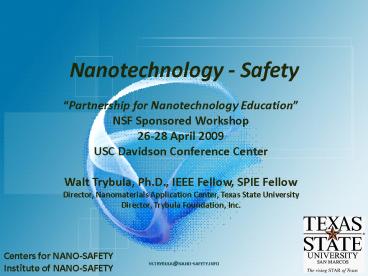Nanotechnology Safety - PowerPoint PPT Presentation
1 / 8
Title:
Nanotechnology Safety
Description:
Director, Nanomaterials Application Center, Texas State University ... Compiled by Jo Twist, BBC News On-Line, July 28, 2004. W.TRYBULA_at_NANO-SAFETY.INFO ... – PowerPoint PPT presentation
Number of Views:244
Avg rating:3.0/5.0
Title: Nanotechnology Safety
1
Nanotechnology - Safety
- Partnership for Nanotechnology Education
- NSF Sponsored Workshop
- 26-28 April 2009
- USC Davidson Conference Center
- Walt Trybula, Ph.D., IEEE Fellow, SPIE Fellow
- Director, Nanomaterials Application Center, Texas
State University - Director, Trybula Foundation, Inc.
Centers for NANO-SAFETY Institute of NANO-SAFETY
2
Projected Advantages
1 - Organic Light Emitting Diodes (OLEDs) for
displays 2 - Photovoltaic film that converts
light into electricity 3 - Scratch-proof coated
windows that clean themselves with UV 4 -
Fabrics coated to resist stains and control
temperature 5 - Intelligent clothing measures
pulse and respiration 6 - Bucky-tubeframe is
light but very strong 7 - Hipjoint made from
biocompatible materials 8 - Nano-particle paint
to prevent corrosion 9 - Thermo-chromic glass to
regulate light 10 - Magnetic layers for
compact data memory 11 - Carbon nanotube fuel
cells to power electronics and vehicles 12 -
Nano-engineered cochlear implant
Compiled by Jo Twist, BBC News On-Line, July 28,
2004
3
The Key Point
- Education on NANO-SAFETY requires
- Communication of Knowledge
- Which requires accurate Information
- Which requires understanding of Principles
- Which requires focused Research
- Which requires . . . . . the list continues
The POINT is that we need to address the
underlying knowledge acquisition in a systematic
manner to understand nanotechnology implications!
4
Reports that Alarm
- 1DuPont published a report in 2004 that indicated
nano-coal dust is harmful to human lungs. I
thought coal miners learned hundreds of years ago
that any type of coal dust is harmful. Why just
nano? - 1A report in 2008 showed that carbon nanotubes,
if created in a special configuration with a very
high dose, can cause a reaction similar to
asbestos (Mesothelioma). As a side note, people
have died due to consuming too much drinking
water! Overdoses may provide good publicity but
can skew perception. - These type of publications are misleading at best
and harmful to scientific efforts are worst. - There needs to be accurate information available.
1http//www.tryb.org/a_white_paper_on_nano-safety.
5
Feel Good Ordinances
- 1The City of Berkeley, California passed an
ordinance in December 2006 requiring information
be provided on all nanomaterial that will be
brought into the city. - Material Safety Data Sheets (MSDS) do not exist
for the majority of nanomaterials. So what to
people do? - CNTs have been classified as graphite (a form of
carbon). Diamonds and coal dust are also forms
of carbon. - Aluminum is highly energetic (explosive) below 20
nanometers when exposed to oxygen. But the MSDS
on aluminum does not indicate that fact. - If laws are passed requiring information that is
not known, people will provide the information
available, which may not be accurate. - We need to be able to address these issues, but
there is not a systematic approach in place.
1http//www.seektress.com/berkeley.htm
6
Material Properties???
Melting point of Gold
Magnetic Materials 13 atoms
Silver properties reported May 30, 2006 in
NanoTechWeb. Platinum experiments reported by
University of Stuttgart.
Known Properties
- Why are there difference from bulk?
- Part of the reason is the percentage of surface
atoms.
Safety?
7
What Must be Done
- Education
- Provide sources of accurate information.
- Provide guidance for the public.
- Educate Businesses.
- Create Knowledge Based Workforce
- Scientist, Engineers, Technicians.
- Assess future liabilities.
- Much, much more.
- Collaboration
- This issue is too large for one school, even one
country to address by itself. Worldwide
collaboration is an absolute necessity.
8
Our Current Efforts
- TSUSNTF addressing NANO-SAFETY insertion into
engineering courses. - Texas State University System meeting on May 1st
to establish Centers for NANO-SAFETY. - Texas State submitted proposals on NANO-SAFETY.
- Collaborations with various schools including
Rice University (CBEN and ICON), others including
community colleges, and NSF NANO-LINK Center. - Looking for more collaboration
- Site operational http//www.NANO-SAFETY.info
- NANO-SAFETY white paper available.
- Site support through the Trybula Foundation, Inc.
- http//www.tryb.org
Coming soon Institute of NANO-SAFETY































